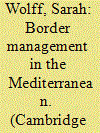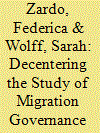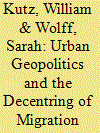|
|
|
Sort Order |
|
|
|
Items / Page
|
|
|
|
|
|
|
| Srl | Item |
| 1 |
ID:
081493


|
|
|
|
|
| Publication |
2008.
|
| Summary/Abstract |
Framed in the Justice and Home Affairs external dimension (JHAE) literature that argues that the European Union's (EU) internal security has become an objective of European foreign policy, this article offers an analysis of the institutionalization of border management in the Mediterranean. Investigating the role of Frontex, the European border management agency, this article reveals that border management in the Mediterranean is a fragmented policy that presents internal and external challenges. First, at an internal level, border management remains a sensitive issue where the principles of burden sharing and solidarity between EU member states are difficult to operationalize. Second, at an external level, effective border management is dependent on cooperation with EU's neighbours, as the Spanish-Moroccan case demonstrates. Lastly, along with these internal and external challenges, border management raises some crucial issues about the opportunity of externalizing surveillance technologies to authoritarian regimes
|
|
|
|
|
|
|
|
|
|
|
|
|
|
|
|
| 2 |
ID:
189104


|
|
|
|
|
| Summary/Abstract |
To what extent can a decentred approach improve our understanding of migration governance? In the field of public policy, it ‘highlights the diverse and contingent meanings that inform the actions of the individuals involved in all kinds of practices of rule’ (Bevir Citation2016, 232). In this special issue we engage indeed not only with decentring the institutions and actors involved, but also the meanings produced, narratives constructed as well as the practices they entail. Applied to the context of international relations and political geography, decentring pays attention to actors´ perceptions and practices that shape the negotiation process (El Qadim Citation2018; İşleyen Citation2018b). It also normatively engages with deconstructing dominant assumptions in the study of world politics (Bilgin Citation2017). In their call for a paradigm shift in the study of the European Union (EU)’s international relations, Fisher Onar and Nicolaïdis argue that decentring involves, first, unpacking “the social scientific categories, assumptions and paradigm that underpin Eurocentric truth claims” and then “engaging with the assumptions and worldviews that underpin others’ accounts” (Onar and Nicolaïdis Citation2013, 286).
|
|
|
|
|
|
|
|
|
|
|
|
|
|
|
|
| 3 |
ID:
189105


|
|
|
|
|
| Summary/Abstract |
In 2018, the International Organization for Migration stated that ‘migration has nearly become synonymous with urbanization, given the dominance of the city as the destination of most migrants’. The geopolitical dimension of migration governance is especially important in Mediterranean cities where the European Union’s (EU) efforts to push border management onto external actors has occurred alongside the transfer of new powers, competencies, and responsibilities for local authorities. Morocco is one such country where a number of administrative and territorial reforms have sought to transform the territoriality of migration governance, and by extension the structure of Euro-Mediterranean affairs. Our objective is to examine more fully how distinctly local aspects of Moroccan migration diplomacy have been harnessed as a force for geopolitical action today. The approach serves to decentre analysis of EU migration policy by rescaling the focus of migration to the urban peripheries of Europe, and to thereby contest Eurocentric accounts of migration governance in the region. Based on an analysis of Moroccan cities’ involvement in migration governance, including the MC2CM Project – a Mediterranean network of cities supported by EU and international actors – we argue that the rescaling of migration diplomacy aims to ‘change the narrative’ about Morocco’s capacity to manage immigration in light of international condemnation of state violence towards sub-Saharan migrants. In particular, devolution is skilfully used to cast Morocco as an advocate for the empowerment of local authorities managing migration, and migrants themselves as an opportunity for socio-economic development. At the same time, however, we observed that the rescaling of migration governance does not so much change the prevailing autocratic securitization of demographic mobility, but rather restructures its coordination through new governing actors (cities) and management techniques (migration).
|
|
|
|
|
|
|
|
|
|
|
|
|
|
|
|
|
|
|
|
|